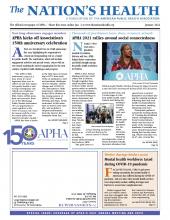
The Olmsted 200 campaign is bringing attention to the need for more parks and open spaces in communities of color in the U.S.
Photo by Kate_sept2004, courtesy iStockphoto
Parks and other green spaces encourage physical activity, improve social cohesion, boost mental health and more. Yet not everyone in the U.S. gets to take advantage of such benefits.
Structural racism — both historical and ongoing — has created inequitable access to nature and its benefits for many Americans, according to Jennifer Roberts, DrPH, MPH, an associate professor at the University of Maryland School of Public Health. A native of Buffalo, New York, Roberts said her mother loved walks in Humboldt Park, which was near a tree-lined boulevard in the city’s predominantly Black East Side neighborhood.
But by the time Roberts was born, the park had become an expressway. The highway displaced residents, divided the neighborhood and destroyed park land designed by renowned landscape architect Frederick Law Olmsted. What happened in Buffalo was not an isolated incident; diverse communities across the U.S. have lost parks to development.
“We have to look at structural racism, exclusion, white privilege and how they intersect with nature connectedness and health equity,” said Roberts, who spoke about parks and equity during APHA’s 2021 Annual Meeting and Expo in October. “We need to restore Mother Nature to everyone.”
Ensuring that parks and public spaces are accessible and welcoming to all is a goal of the Olmsted 200 campaign, which is marking Frederick Law Olmsted’s 200th birthday this year.
Known as the founder of landscape architecture and the designer of hundreds of parks, Olmsted was also a social reformer who believed that parks and green spaces belong to everyone, according to Anne Neal Petri, JD, president and CEO of the National Association for Olmsted Parks.
“Parks are not luxuries,” Petri said. “They are essential to our ecological, social and healthy well-being.”
To address park inequities, “we need to change our process,” according to Rachel Bennett, MPH, MURP, program manager of People, Parks and Power: A National Initiative for Green Space, Health Equity and Racial Justice.
Led and managed by the Prevention Institute, the initiative is funding organizations in urban, low-income communities of color that support park equity, with awards to be announced in March. Rather than focusing on individual, on-the-ground projects, awardees will receive up to $500,000 for work on upstream policy and systems change.
For more on the Olmsted 200 campaign, visit https://olmsted200.org. For information on People, Parks and Power, visit https://preventioninstitute.org.
A version of this story was published on APHA’s Annual Meeting Blog.
- Copyright The Nation’s Health, American Public Health Association









